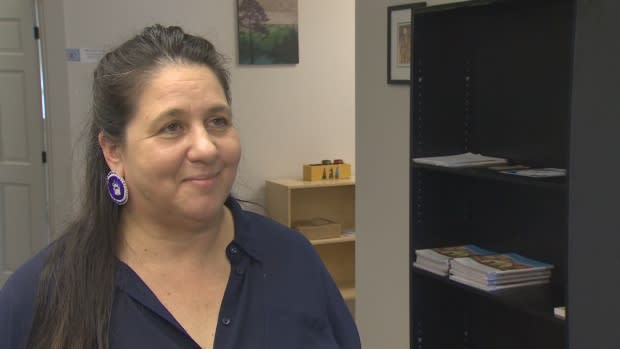Wabanaki women's organization opens new office in Fredericton
The Indigenous Women's Association of the Wabanaki Territories has opened its first office since forming four years ago.
The office, located on the north side of Fredericton, will help the association provide better advocacy services to all Indigenous women in New Brunswick. The non-profit organization advocates for missing and murdered Indigenous women and girls, as well as LGBTQ2S people.
The organization hasn't had a fixed office space until now and has mostly been working with a small staff and volunteers. This new office space will allow for them to take the organization to new levels of success in helping Indigenous women in the province.
"Today was a result of the federal government's commitment to Indigenous women, we were able to open an office," said Gail Paul, the president of the association on Monday at the new office.
The advocacy group, which is the provincial branch of the Native Women's Association of Canada, also helps Indigenous women by providing services such as employment training programs and scholarships.

Lynne Groulx, CEO of the Native Women's Association of Canada, said that her organization signed an accord with the federal government back in February that allows them to provide the Indigenous Women's Association of the Wabanaki Territories with core funding over the next four years.
The accord recognizes and provides funding for Indigenous women's rights in Canada, she said.
"And [it] provides for our voices to be heard at federal and provincial territorial tables, and at different levels of the government," she said.
The core funding from Native Women's Association of Canada will provide the Indigenous Women's Association of the Wabanaki Territories with $100,000 per year for the next four years.
The association will also receive $500,000 spread over the next four years from the federal Department of Women and Gender Equality to expand the small staff for proposal writing, governance consulting and communications.

"With the capacity building dollars, we can advance the work that was initiated on a volunteer level and provide real deliverable, always keeping the the women's voices at the centre," Paul said.
Fredericton was chosen as the location for Indigenous Women's Association of the Wabanaki Territories because it is a central area for all Indigenous women in New Brunswick who seek their services to gather.
Paul said organizations such as hers are important to Indigenous governance because they help give Indigenous women back their voice. She said Indigenous women have become silenced over time through mechanics of colonization, such as the Doctrine of Discovery, Indian Act, Sixties Scoop and Indian residential schools.
"How do you destroy Indigenous women? You take their children away," she said.
"When the Europeans came and they initiated the Doctrine of Discovery, that was when the women lost their voices. That was when the patriarchal system came in and it just it decimated the women."
All of those issues play a huge role on the current generations of Indigenous women, said Paul, a Dakota Sioux who married a Wolastoqey man and has lived in Woodstock First Nation for more than 20 years.
"We have strong Indigenous women all across the country and we're all speaking forward, we're all coming forward and telling our stories and telling our truths," Paul said. "It's important that the general public really, really look at the the results of the National Inquiry on the Missing and Murdered Indigenous Women and see that yes, it was genocide. They did try to kill us."
Resiliency centres
In the wake of the MMIWG inquiry's final report, the National Women's Association of Canada will open a resiliency centre on-site at its national headquarters in Gatineau, Que. The resiliency centre will provide women with healing services and counselling by elders onsite.
Groulx said she hopes that after a year-long evaluation period they'll be able to open similar centres across the country in their provincial cohorts, which could be on-site at the new office Indigenous Women's Association of the Wabanaki Territories.
"As you know we had this inquiry and we have a report that's come out and it does talk about healing services," Groulx said. "We hope to provide an excellent service for Indigenous women in that regard."
Groulx predicted the Indigenous Women's Association of the Wabanaki Territories will have a large clientele and that the new office will be an adequate and safe space for Indigenous women to seek assistance.

